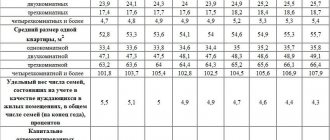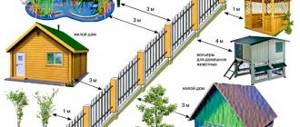Accounting for postings to a homeowners' association under general taxation
Greetings! A homeowners' association is a non-profit organization that is created by the owners of premises for the joint management of common property and its maintenance, for the receipt of utilities.
A company is formed through state registration of a legal entity. The decision to create an HOA is made at a general meeting of owners by a majority (Article 135 of the Housing Code of the Russian Federation).
The amount that each owner of the premises has is proportional to his share in the ownership of common property in a given house (Clause 3 of Article 48 of the Housing Code of the Russian Federation). To ensure its activities, the partnership has hired personnel - at least a board headed by the chairman of the board.
According to the Federal Law of 05.05.2014 No. 99-FZ, from September 1, 2014, HOAs are classified as partnerships of real estate owners. (TSN) Homeowners' association does not apply to small businesses.
The HOA keeps records of targeted funds in account 86 “Targeted Financing”. For account 86, it is necessary to open sub-accounts based on the sources of funds received. Let's consider the accounting of HOA fees, except for payments for housing and communal services, the accounting of which will be discussed below.
Operation Account debit Account credit Accrual of contributions due from HOA members, including contributions for major repairs 76 “Settlements with various debtors and creditors” 86 “Targeted financing” Receipt of contributions (except for contributions for major repairs, which are accumulated in a special account) 50 “Cash ", 51 "Current accounts" 76 "Settlements with various debtors and creditors" Receipt of contributions for major repairs 55 "Special accounts in banks" 76 "Settlements with various debtors and creditors" Reflection of current expenses for managing common property 20 "Main production", 26 “General business expenses”, etc.
Accounting in a homeowners' association: procedure and features
Attention
Advice: to avoid disputes with inspectors, enter into an agency agreement before signing contracts with contractors or resource supply organizations. Otherwise, such mediation will be called into question. Since in this situation it is impossible to act in the interests of third parties without having a prior agreement with them.
This follows from Article 1011 of the Civil Code of the Russian Federation and paragraph 6 of the information letter of the Presidium of the Supreme Arbitration Court of the Russian Federation dated November 17, 2004 No. 85. An example of reflection in accounting and taxation of operations for the maintenance of the common property of an apartment building (contract method) HOA "Alpha" uses a simplified form ( the object of taxation is “income minus expenses”). The annual estimate of income and expenses for the current year includes expenses for the maintenance of common property in the amount of 1,200,000 rubles.
Basic rules for accounting in a homeowners' association (nuances)
Simplified organizations take into account income in accordance with Articles 249 and 250 of the Tax Code of the Russian Federation and do not take into account income specified in Article 251 of the Tax Code of the Russian Federation (Article 346.15 of the Tax Code of the Russian Federation).
Funds of owners (consumers) received for the maintenance of common property and the provision of utilities are not recognized as earmarked funds on the basis of subparagraph 14 of paragraph 1 of Article 251 of the Tax Code of the Russian Federation and are not included in the rest of the list of non-taxable income (Articles 251 and 346.15 of the Tax Code of the Russian Federation).
And penalties accrued to homeowners for non-payment of housing and communal services are non-operating income (clause 3 of Article 250 of the Tax Code of the Russian Federation, letter of the Ministry of Finance of Russia dated April 5, 2013 No. 03-11-06/2/11195).
If the HOA (TSN) pays a single tax on the difference between income and expenses, then the cost of goods (work, services) purchased for the maintenance of common property can be taken into account as expenses (subclauses 1 and 6 of clause 1 of Art.
How is accounting carried out in a homeowners' association?
But at the same time, it is important to correctly take into account all income, as well as expenses that can reduce the amount of tax (sick leave, insurance payments).
By electing to be taxed at the 15% tax rate, the taxpayer has the opportunity to obtain maximum tax benefit, especially when the partnership's expenses approach its revenue. Accounting is more complex than in the previous version.
Accounting for utility payments It is necessary to pay attention to the procedure for accounting for utility payments received from the owners of premises when applying the simplified tax system in the partnership.
The organization's charter may stipulate its obligation to provide such services to its members and enter into contracts with suppliers on their behalf. In this case, only the difference between the amount of income from utility bills and their cost is subject to taxation, i.e. remuneration to the partnership for the services of an agent.
Accounting and tax accounting in homeowners' associations (tsn): postings, documents, benefits
Statistical reporting Non-profit organizations are entrusted with the responsibility for compiling statistical reporting. Homeowners' associations report to the statistical authorities, the list of forms of statistical observation is specified in the branches of Rosstat.
Disclosure of information Homeowners' associations (TSN) are obliged to disclose information about the main indicators of their financial and economic activities. (Clause 10 of Article 161 of the Housing Code of the Russian Federation. The forms on which information must be posted are approved by the Ministry of Construction of Russia (Order of the Ministry of Construction of Russia dated December 22, 2014 No. 882/pr).
For violation of legal requirements on the disclosure of information on the management of an apartment building, administrative liability is provided (Article 7.23.1 of the Code of Administrative Offenses of the Russian Federation).
Postings in a homeowners' association - basic examples
- contributions;
- from the owners for the maintenance of the property;
- from the budget for real estate repairs, including capital ones.
According to the charter of the HOA, the main purpose of its creation is the maintenance of common real estate and the provision of utilities to members of the partnership.
Therefore, all funds received by the partnership for such purposes are not included in the income of the organization. It is necessary to take into account that funds received for these purposes from HOA members are not considered income.
Source: https://dtpstory.ru/buhg-provodki-v-tszh-pri-obshhem-nalogooblozhenii/
Taxation of homeowners' associations with a legal system in 2020
Attention, the HOA for the reporting year, in addition to presentation to the owners, must publish:
- on the HOA website (if any);
- on the website reformagkh.ru.
The estimates are checked by the territorial housing inspection. The form of the report for publication is established by the order of the Ministry of Construction of Russia “On approval of information disclosure forms in the field of management of apartment buildings” dated December 22, 2014 No. 882/pr. In addition, the accounting department of the HOA ensures the submission of reports and settlements with tax authorities and extra-budgetary “salary” funds.
Despite the non-commercial nature of the activity, the HOA in any case reports and calculates:
- with the Federal Tax Service - for 2-personal income tax, 6-personal income tax and the average number;
- from FSS - according to 4-FSS;
- with the Pension Fund of Russia - according to RSV-1 and SZV-M.
As you can see, all these calculations are related to the payment of wages to persons involved in supporting the activities of the HOA.
Why do you need to lead?
A partnership is one of the most acceptable forms of governance and maintenance of a building after its commissioning.
According to many owners, this form is the most suitable, since the management team is created from the very same residents of the house. In this case, the organization is a non-profit, however, a legal entity, all this means that it is a taxpayer.
This state of affairs requires the company to have an accountant on staff, a person who knows what reporting, balancing, and postings are.
With the help of accounting control of all vital functions of the partnership, 3 main tasks are solved:
- Collection and processing of information about the organization’s events;
- Compliance with legal requirements for accounting of economic and financial processes;
- Analysis of the financial state of affairs.
The presence of an accountant is also mandatory for the reason that the society has direct access to the finances of all homeowners. Sample accounting policy for HOAs under the simplified tax system -
What laws (codes, acts, etc.) is regulated?
When maintaining entries for expenses and income of an enterprise, the form of clause 6 of PBU 1/2008 “Accounting Policy of the Organization” approved by the Order of the Ministry of Finance is used, according to which any kind of management must be reflected properly.
According to accepted standards, the activities of HOAs are considered as the provision of services with the ensuing results and responsibility in the form of reflecting income in tax documentation and using account 90 in accounting.
These actions are regulated by the Tax Code of the Russian Federation, in particular Art. 251 and Art. 249.
A letter from the Ministry of Finance from 2011 provides a clear explanation of which payments are subject to taxation and which are defined as targeted.
The Letter of the Federal Tax Service of 2011 clearly stated that the entire list of income subject to taxation depends on the contractual obligations of the company.
In addition, all work of the enterprise is regulated by the articles of the Housing Code of the Russian Federation.
Accounting in HOAs: procedure and features
There are many different ways to manage multifamily housing. One such way is to create a homeowners' association.
This is an independent legal entity that must meet the requirements imposed on it by the legislation of the Russian Federation.
In the article you will find information on how to generate a simplified annual report and consider the main accounting entries.
One of the legal requirements for HOAs is to maintain accounting records. This article will discuss how to properly maintain accounting records in an HOA and submit reports to regulatory authorities in a timely manner.
Features of accounting in HOAs
Different partnerships can be created by law in different situations, but if we are talking about a homeowners’ association, then it is created, as a rule, to manage an apartment building.
In rare cases, owners of private houses living in the neighborhood unite into homeowners' associations within the same district or locality to carry out joint activities and increase efficiency in achieving joint goals.
Be that as it may, the creation of an HOA is justified by the presence of related tasks and aspirations. And since the HOA is an independent legal entity, it is required to keep accounting records.
Accounting in an HOA is necessary in order to competently manage the real estate for which the owners created this non-profit entity.
Thus, among the tasks of the HOA we can highlight:
Sources of HOA financing:
- receipts from members (fees upon joining the HOA);
- injections in the form of subsidies;
- profit from commercial activities, if carried out by the HOA.
No matter what agreements the association of owners enters into, no matter what activities it carries out, all funds received must be spent strictly in the interests of the home owners who formed the association.
Review of changes in tax and accounting legislation since 2018
Alexandra Razzhivina, chief accountant of LLC Accounting Firm Business Asset
From this article you will learn about the main changes in accounting and tax accounting that organizations managing apartment buildings must apply in their work from January 1, 2020.
Benefits for making contributions from founders.
Starting from 2020, the taxable income tax base does not include contributions to property that the founders transferred for any purpose, and not just to increase net assets.
Making such a contribution must be provided for in the constituent documents. These contributions do not increase the size of the authorized capital and do not change the nominal value of shares and shares. New subparagraph 3 regulates these relations.
7 paragraph 1 of Article 251 of the Tax Code.
Read the full text of the article in the magazine “MKD Management”.
Despite the fact that HOAs are legally classified as non-profit organizations, the law still allows them to conduct commercial activities within very limited limits. Accounting in an HOA allows you to track for what purposes the profit from the organization’s commercial activities is spent.
The HOA has the right:
- provide premises for rent in apartment buildings;
- conduct the construction of additional real estate;
- maintain and repair the partnership's property.
The partnership must carry out these actions in the interests of the owners, and not for the purpose of generating income. But in some cases, the HOA directly acts to generate income, for example:
- concludes agreements with third-party organizations for the placement of advertising using the property of the apartment building, allows for money the use of the real estate of the partnership by organizations that provide telecommunications, cable television, and the Internet to the house;
- concludes lease agreements for non-residential premises that relate to common property;
- concludes agreements for the provision of services with residents, providing them with specialists for repairs in the apartment, etc.
Accounting in an HOA is designed to control the flow of funds and reflect revenue in the correct accounts. The HOA must form funds from the funds received, which accumulate funds and direct them to the needs provided for by the partnership.
The obligation of HOA members is to pay monthly bills:
- for current and major repairs;
- for utilities;
- on the costs of maintaining an apartment building;
- other expenses.
Accounting for the HOA is carried out by members of its board. That is, the HOA is a legal entity, and, like any legal entity, it has its own management apparatus.
Members of the board are those positions that are called upon to maintain accounting records in strict accordance with the requirements of the law.
One of these requirements is the obligation to submit reports to supervisory and control authorities (Pension Fund, tax inspectorates, territorial statistical bodies).
Accounting in an HOA is essentially no different from accounting in another non-profit organization. The reporting consists of a balance sheet, a report on the intended use of funds and a statement of financial results.
At the same time, the HOA maintains accounting records regardless of whether the organization conducts commercial activities or not.
The simplified taxation system in itself is also not a reason for an HOA not to keep accounting records.
And yet, accounting in HOAs has some of its own characteristics, although it is based on principles common to this type of activity.
- The main purpose of preparing financial statements is a reliable reflection of the actual financial condition of the organization. It is compiled at the end of a reporting period. HOAs, as a rule, report at the end of the year. All members of the partnership have the right to study the accounting reports in detail, because the profit of the partnership is information that is prohibited from hiding from the owners.
- Having studied financial documents with the results of last year, members of the partnership will be able to make the right decisions for the coming year. Thus, the HOA accounting department draws up an estimate of expenses and income for the next financial year, and this estimate must be approved at a general meeting of owners. The approved estimate will subsequently become the backbone for accounting in the HOA.
- After the estimate is approved, it must be posted on the official website of the partnership and on the federal resource reformagkh.ru. Next, the partnership will need to report on how this estimate is being implemented. Control over compliance with legal norms when spending funds belongs to housing supervision authorities. It is the territorial housing inspection inspection that checks estimates and maintains reports on their implementation (information disclosure form in the field of management of apartment buildings, approved by Order of the Ministry of Construction dated December 22, 2014 No. 882/pr).
- Responsibility of the HOA for debts and property
How is accounting regulated in HOAs?
Keeping accounting records in HOAs is based on legislative acts that are relevant for any business activity. Any organization has a specially designated place for storing numerous laws and regulations, internal regulations that regulate this area of functioning of an economic entity.
How to draw up a balance sheet and income statement of a management company
The article will help to formulate the main indicators of assets and liabilities of the balance sheet in the management company and draw up a report on financial results.
Basic documents for the accounting department of the HOA:
- Federal Law “On Accounting” dated December 6, 2011 N 402-FZ;
Source: https://www.gkh.ru/article/102335-buhgalterskiy-uchet-v-tsj
Leave a comment on the document
Do you think the document is incorrect? Leave a comment and we will correct the shortcomings. Without a comment, the rating will not be taken into account!
Thank you, your rating has been taken into account. The quality of documents will increase from your activity.
| Here you can leave a comment on the document “Order on Accounting Policies for Accounting and Taxation Purposes”, as well as ask questions associated with it. If you would like to leave a comment with a rating , then you need to rate the document at the top of the page Reply for |
Accounting, tax accounting and reporting in HOAs
Many owners of urban real estate located in apartment buildings decide to create an HOA.
This is done not only to optimize utility costs, but also to maintain residents’ property in proper technical condition.
Each partnership of real estate owners must be organized in accordance with the regulations of Federal law. At the same time, the HOA is required to maintain accounting records and submit reports generated based on the results of the reporting periods to the tax office.
Features of creating an HOA
The purpose of creating an HOA is to:
- effective management of real estate, which legally belongs to the participants of the partnership;
- timely repair and maintenance of utilities;
- calculation of utilities according to real and not inflated tariffs;
- improvement of the area adjacent to apartment buildings, etc.
Federal law does not prohibit property owners' associations from engaging in commercial activities whose purpose is to generate income. In this case, we are not talking about running a business in its direct sense, but about providing small services on a paid basis for the participants of the partnership:
- construction of additional real estate;
- advertising placement;
- rental of real estate;
- carrying out repair work, etc.
When concluding any agreements, the management of the HOA must respect the interests of the homeowners. All proceeds received go to the current account of the partnership. After this, the funds are distributed to special funds.
The HOA can spend it only in those areas that were reflected in the statutory documentation approved by all property owners.
All funds that will be credited to the current account in the form of membership fees can only be used to pay for utilities, as well as to maintain real estate in proper technical condition.
Russian legislation allows not only owners of city apartments to unite in HOAs, but also owners of private houses located on adjacent land plots.
The procedure for generating funds
Our articles talk about typical ways to resolve legal issues, but each case is unique. If you want to find out how to solve your specific problem, please contact the online consultant form on the right →
Or call us by phone (24/7).
It's fast and free!
+7 Moscow and Moscow region
Accounting in an HOA involves recording all transactions that are directly or indirectly related to the partnership. The specialist who will be entrusted with accounting is required to draw up primary documentation, the data from which must be posted to the appropriate registers.
When organizing accounting in a partnership, incoming funds from which capital is formed must be registered in a separate accounting register:
- contributions for major repairs;
- receipts in the form of entrance and membership fees;
- penalties for late paid utilities (the full amount of rent is not included);
- subsidies;
- the difference between received utility payments and their actual cost;
- income received while conducting commercial activities, etc.
How should utility bills be accounted for?
If utility payments have been accrued to the owners of real estate, they must be reflected in the appropriate accounting accounts.
The difference that arises between the actual and nominal cost of utility bills is subject to taxation at rates approved by current legislation.
If payment for utility services is received into the current account from property owners who have not entered into a partnership and have not entered into an agreement with it for the provision of agency services, then the HOA accounting department must accrue taxes on them in full.
Features of accounting
Features of accounting in HOAs are as follows:
- Based on the results of the reporting period (as a rule, this is a calendar year), financial statements of the HOA are compiled, which are transferred to the members of the partnership for study. The reports must contain reliable information from which property owners can learn about the activities of the partnership, as well as what profit the HOA made.
- Accountants prepare an estimate of expenses and income for the next year, which must be approved at a general meeting of members of the partnership. In the future, it is this document that specialists will rely on when maintaining accounting and tax records in the HOA.
- Information related to the execution of the approved estimate for the reporting period must be posted on the official website of the HOA. The responsibility for checking such estimates is assigned by Federal legislation to the housing supervision inspection (territorial).
Basic accounting entries in the HOA:
Debit business transactionsCredit
| 76 | Debt in contributions, which is registered with a member of the company | 86 |
| 62 | Debt owed by the owner of a property who refused to join the company | 90 |
| 26 | Expenses that arise during the maintenance of property owned by the company | 70, 69, 02, 10 |
| 26 | Tax calculation under the simplified taxation system | 68 |
| 26 | Costs incurred by the partnership in maintaining its premises in proper technical condition, as well as payment for the services of third-party organizations providing their maintenance | 60 |
| 86, 20 | Distribution of society's costs associated with property maintenance among property owners who have refused membership in the HOA | 26 |
| 90 | Write-off of costs incurred by the company for the maintenance of property that is not the property of the HOA participants | 20 |
| 90 | Expenses associated with servicing the current account, accrued commissions, etc. | 51 |
| 99 | Carrying out balance sheet reformation if the company made a profit based on the results of the reporting period | 84 |
| 84 | Use of the company's retained earnings for targeted financing | 86 |
| 76, 62 | Presentation of company losses for compensation | 84 |
| 86, 20 | Creation of a special fund, the funds of which can be spent on repair work | 96 |
Accounting entries of a partnership operating on the simplified tax system:
Debit business transactionsCredit
| 76 | Accrual of mandatory contributions to members of the company, which must be made within the time limits approved at the general meeting, in particular contributions that are submitted by all owners for major repairs | 86 |
| 50, 51 | Receipt of contributions from property owners to the current account or cash desk (with the exception of contributions for major repairs, since these amounts must be accumulated in a special account) | 76 |
| 55 | Receipt of contributions from members of the society intended for major repairs | 76 |
| 20, 26 | Reflects the costs of the current period that are associated with the maintenance and management of HOA property | 60, 76 |
| 86 | The costs incurred by the company in managing and maintaining the property are written off (the costs were borne from funds from the fund created for targeted financing) | 20, 26 |
How are reports generated and submitted?
Accounting in HOAs requires the mandatory generation of reports that must be submitted both to the Federal Tax Service and to statistical authorities and extra-budgetary funds. Accounting statements in such partnerships are prepared for the year (even if the HOA does not carry out commercial activities and is on the simplified tax system), and includes:
- Balance.
- Report on the intended use of funds.
- Register of members of the partnership.
- Income statement.
In addition to accounting reports, the partnership must submit the following forms related to the calculation and payment of wages:
| Federal Tax Service | Form 6-NDFLForm 2-NDFLAverage number of employees |
| Pension Fund | Form SZV-MFForm RSV-1 |
| FSS | Form 4-FSS |
If the activities of the HOA are carried out on a simplified basis, then it is necessary to submit a corresponding declaration to the Federal Tax Service. It is worth noting that HOAs under the simplified tax system are exempt from paying the following taxes:
- at a profit;
- on property;
- VAT.
Taxation under the simplified tax system provides for the opportunity for a partnership to independently determine its own rate:
- A 6% rate is applied to income.
- A rate of 15% is applied to the difference between income and expenses.
The HOA on OSNO is obliged to accrue and pay to the budget all taxes and fees provided for by law, as well as submit the relevant declarations to the regulatory authorities. For late submission of reports, the responsible persons of the partnership will be subject to penalties and interest.
Taxation
Each HOA created by the owners of real estate has the right to independently choose a taxation system for itself. Federal legislation provides for the following tax regimes for such partnerships:
During the process of state registration of an HOA, its owners can choose a simplified taxation system.
If they do not indicate this in the appropriate application, the HOA will be automatically transferred to the general taxation system.
Specialized Internet resources contain step-by-step instructions that will allow property owners to avoid mistakes when carrying out registration activities.
When determining the tax base, accountants of such partnerships must clearly distinguish which of the funds received can be considered income and which will not be taxed.
If funds from property owners in the form of contributions for major repairs are transferred to the current account, they will not be subject to taxation.
But, at the same time, if funds for the same purposes come from property owners who refused to join the HOA, then they will be considered income of the partnership.
All funds received to the accountant's current account or to the cash desk of the accountant's partnership must be accounted for separately. Also, separate records should be kept in the appropriate registers of all costs that were incurred at the expense of earmarked revenues.
Based on the results of each period, accountants must prepare reports that are submitted to regulatory authorities. They must transfer all taxes to the budget within the deadlines established by law.
If the requirements of the Tax Code of the Russian Federation are violated, penalties will be applied to the HOA.
Source: https://ozhkh.ru/tovarishhestvo-sobstvennikov-zhilya/buhgalterskij-uchet-tszh
What laws must be followed?
And you can make an accounting policy for yourself and your taxation system for free in the “Accounting Policy Designer” program, which is built into the “Bukhsoft” program.
In the case where the partnership has switched to a simplified tax calculation scheme, tangible assets in the form of repair equipment, snow removal machines, etc. are not subject to taxation, as they relate to target assets. Part of the cash receipts included in the asset of the partnership is considered to be income that is subject to taxation in accordance with tax legislation.
The accounting policy (AP) approved by order of the manager is a standard that regulates for the organization issues that are not specified in federal laws and similar acts or those for which options for accounting and reporting are allowed.
Accounting for a homeowners' association, simplified posting using an example in 2018
The partnership's financial statements for the year include:
- balance;
- income statement;
- report on the intended use of funds.
The responsibility for accounting and reporting remains with the HOA, even if it does not conduct commercial activities and applies the simplified tax system. In addition to the above forms, the HOA is required to maintain a register of members of the partnership.
Tax accounting for a homeowners' association. Features of accounting under the simplified tax system. In most cases, the HOA prefers a simplified system.
The main advantage of the simplification for HOAs is a reduction in insurance premiums (20% rate). The HOA accountant must distinguish between receipts that are classified as income and amounts that do not fall under this definition and, accordingly, under taxation.
How a homeowners association on a “simplified” street can keep records of income and expenses (Zhuravleva V.V.)
Answers to pressing questions Question No. 1. How are the amounts received in payment of utility bills from the residents of the house reflected in the HOA's accounting? If the obligation to provide utility services to residents is specified in the charter of the partnership, then receipt of payment for this is reflected in the following entries:
- Dt62, 76 Kt 90 – the amount of payment for utilities has been accrued;
- Dt 50, 51 Kt 62, 76 – utility payments received at the cash desk or on account.
If such calculations are carried out under agency agreements, then:
- Dt 76 Kt 60 - the amount of payment for utilities has been accrued;
- Dt 76 Kt 90 – for the amount of remuneration under the agency agreement;
- Dt 50, 51 Kt 76 - utility bills received at the cash desk or on account.
Analytical accounting for accounts 62 and 76 is carried out for each property owner individually.
How to keep accounting records in a homeowners' association using the usn system? step by step instructions and wiring
Important Greetings! A homeowners' association is a non-profit organization that is created by the owners of premises for the joint management of common property and its maintenance, for the receipt of utilities.
A company is formed through state registration of a legal entity. The decision to create an HOA is made at a general meeting of owners by a majority (Article 135 of the Housing Code of the Russian Federation).
The amount that each owner of the premises has is proportional to his share in the ownership of common property in a given house (clause 3 of article 48
Housing Complex of the Russian Federation). To ensure its activities, the partnership has hired personnel - at least a board headed by the chairman of the board. According to the Federal Law of 05.05.2014 No. 99-FZ, from September 1, 2014, HOAs are classified as partnerships of real estate owners.
(TSN) Homeowners' association does not apply to small businesses.
Accounting, tax accounting and reporting in homeowners' associations
The following income does not count as partnership income under the simplified tax system:
- contributions;
- from the owners for the maintenance of the property;
- from the budget for real estate repairs, including capital ones.
According to the charter of the HOA, the main purpose of its creation is the maintenance of common real estate and the provision of utilities to members of the partnership. Therefore, all funds received by the partnership for such purposes are not included in the income of the organization.
It is necessary to take into account that funds received for these purposes from HOA members are not considered income. But funds received for the same purposes from persons who are not members of the partnership are considered income and are subject to taxation. Cash receipts that are subject to and non-taxable must be accounted for separately.
Source: https://redtailer.ru/buhuchet-v-tszh-uproshhenka-provodki-na-primere-v-2018-godu/
Comment on the rating
Thank you, your rating has been taken into account. You can also leave a comment on your rating.
Is the sample document useful?
If the document “Order on Accounting Policies for Accounting and Taxation Purposes” was useful to you, we ask you to leave a review about it.
Remember just 2 words:
Contract-Lawyer
And add Contract-Yurist.Ru to your bookmarks (Ctrl+D).
You will still need it!
Simplified accounting for HOAs in 2020: postings
To jointly manage the common property of an apartment building, the owners of premises can unite into homeowners' associations (HOAs) (Article 135 of the Housing Code of the Russian Federation). We will tell you how to keep accounting and pay taxes for homeowners associations using the simplified tax system in our article.
Simplified accounting for HOAs in 2020: postings
The HOA is a non-profit organization (clause 4, clause 3, article 50 of the Civil Code of the Russian Federation). The funds of the HOA consist of the following (clause 2 of Article 151 of the Housing Code of the Russian Federation):
- mandatory payments, entrance and other fees of HOA members;
- payments from homeowners who are not members of the HOA;
- income from the entrepreneurial activities of the HOA, aimed at fulfilling the goals, objectives and responsibilities of the HOA (Article 152 of the Housing Code of the Russian Federation);
- subsidies for the operation of common property, carrying out current and major repairs, providing certain types of utilities and other subsidies;
- other supply.
The HOA keeps records of targeted funds in account 86 “Targeted Financing”. For account 86, it is necessary to open sub-accounts based on the sources of funds received. Let's consider the accounting of HOA fees, except for payments for housing and communal services, the accounting of which will be discussed below.
Operation Account debit Account credit
| Accrual of contributions due from HOA members, including contributions for major repairs | 76 “Settlements with various debtors and creditors” | 86 “Targeted financing” |
| Receipt of contributions (except for contributions for major repairs, which are accumulated in a special account) | 50 “Cash desk”, 51 “Cash accounts” | 76 “Settlements with various debtors and creditors” |
| Receipt of contributions for major repairs | 55 “Special bank accounts” | 76 “Settlements with various debtors and creditors” |
| Reflection of current expenses for managing common property | 20 “Main production”, 26 “General expenses”, etc. | 60 “Settlements with suppliers and contractors”, 76 “Settlements with various debtors and creditors” |
| Write-off of costs for managing common property using targeted funding | 86 “Targeted financing” | 20 “Main production”, 26 “General expenses”, etc. |
Accounting for the business activities of the HOA is carried out in the usual manner using account 90 “Sales”.
Taxation of HOAs under the simplified tax system in 2020
When determining income under the simplified tax system, in particular, income received within the framework of targeted financing (clause 1, clause 1.1, article 346.15, clause 14, clause 1, article 251 of the Tax Code of the Russian Federation) and targeted revenues (clause 2, art. 251 of the Tax Code of the Russian Federation). These HOAs may include, in particular:
- entrance and membership fees for HOA participants;
- donations;
- budget funds to finance major repairs in accordance with Federal Law dated July 21, 2007 No. 185-FZ and the Housing Code of the Russian Federation;
- funds from homeowners going to the HOA for repairs.
These incomes are not taken into account only if the HOA keeps separate records of income and expenses for target funds. If there is no separate accounting, then the target revenues are taken into account in the income of the simplifier on general terms.
The HOA develops the procedure for maintaining separate accounting independently and consolidates it in its accounting policy for tax purposes. As examples for developing registers for recording the receipt and use of earmarked funds, you can use the sample registers given in the Recommendations of the Ministry of Taxes of the Russian Federation.
At the same time, in the simplified version of the KUDiR, the HOA does not reflect income and expenses that are not taken into account when calculating tax under the simplified tax system.
Accounting policy of the organization - sample 2020
If you are in doubt about which option to choose, follow the majority opinion! But first, let's define: Your organization is This is important because in accounting small businesses are given a number of concessions.
But in order to use them, you need to consolidate your choice in your accounting policies. Small businesses can conduct accounting in a simplified manner.
: - organizations whose accounting records are subject to mandatory audit (for example,); — housing (housing construction) and credit cooperatives; — microfinance organizations; - Bar associations and law bureaus.
Your organization is What taxation regime does your organization apply: the general taxation regime combines the general taxation regime and payment of UTII; the simplified taxation system combines the simplified taxation system and payment of UTII. Depending on the taxation regime, an accounting policy for tax purposes will be formed (sample).










